
A family curse or an ancestral curse, a generational curse, hereditary curse, is a curse, on a family. The belief in them crosses many religious beliefs. There is no reliable scientific evidence that curses exist.

A family curse or an ancestral curse, a generational curse, hereditary curse, is a curse, on a family. The belief in them crosses many religious beliefs. There is no reliable scientific evidence that curses exist.
Christianity and Judaism have somewhat conflicted views of generational curses,
19 Yet say ye, Why? doth not the son bear the iniquity of the father? When the son hath done that which is lawful and right, and hath kept all my statutes, and hath done them, he shall surely live. 20 The soul that sinneth, it shall die. The son shall not bear the iniquity of the father, neither shall the father bear the iniquity of the son: the righteousness of the righteous shall be upon him, and the wickedness of the wicked shall be upon him.
However,
18 The LORD is longsuffering, and of great mercy, forgiving iniquity and transgression, and by no means clearing the guilty, visiting the iniquity of the fathers upon the children unto the third and fourth generation.
In Greek mythology, the Erinyes exacted family curses. [4] [5] Certain dynasties have had tragic occurrences happen upon them.
The House of Cadmus, who established and ruled over the city of Thebes, was one such house. After slaying the dragon and establishing Thebes upon the earth that the dragon terrorized, Ares cursed Cadmus and his descendants because of the dragon’s sacredness to Ares. Similarly, after Hephaestus discovered his wife, Aphrodite, having a sexual affair with Ares, he became enraged and vowed to avenge himself for Aphrodite's infidelity by cursing the lineage of any children that resulted from the affair. Aphrodite later bore a daughter, Harmonia, the wife of Cadmus, from Ares' seed.
Cadmus, annoyed at his accursed life and ill fate, remarked that if the gods were so enamoured of the life of a serpent, he might as well wish that life for himself. Immediately Cadmus began to grow scales and change into a serpent. Harmonia, after realizing the fate of her husband, begged the gods to let her share her husband's fate. Of the House of Cadmus, many had particularly tragic lives and deaths. For example, King Minos of Crete’s wife fall madly in love with the Cretan Bull and bore the Minotaur. Minos would later be murdered by his daughters whilst bathing. Semele, the mother of Dionysus by Zeus, was turned into dust because she glanced upon Zeus’ true godly form. King Laius of Thebes was killed by his son, Oedipus. Oedipus later (unknowingly) marries the queen, his own mother, and becomes king. After finding out he gouges his eyes and exiles himself from Thebes.
Another dynasty that was cursed and was subject to tragic occurrences was the House of Atreus (also known as the Atreides). The curse begins with Tantalus, a son of Zeus who enjoyed cordial relations with the gods. To test the omniscience of the gods, Tantalus decided to slay his son Pelops and feed him to the gods as a test of their omniscience. All of the gods, save Demeter, who was too concerned with the abduction of her daughter Persephone by Hades, knew not to eat from Pelops’ cooked corpse. After Demeter had eaten Pelops’ shoulder, the gods banished Tantalus into Tartarus where he would spend eternity standing in a pool of water beneath a fruit-bearing tree with low branches. Whenever he would reach for a fruit, the branches would lift upward so as to remove his intended meal from his grasp. Whenever he would bend over to drink from the pool, the water would recedes into the earth before he could drink. The gods brought Pelops back to life, replacing the bone in his shoulder with a bit of ivory with the help of Hephaestus, thus marking the family forever afterwards.
Pelops would later marry Princess Hippodamia after winning a chariot race against her father, King Oenomaus. Pelops won the race by sabotaging of King Oenomaus’ chariot, with the help of the king’s servant, Myrtilus. This resulted in King Oenomaus’ death. Later, the servant Myrtilus, who was in love with Hippodamia, was killed by Pelops because Pelops had promised Myrtilus the right to take Hippodamia's virginity in exchange for his help in sabotaging the king’s chariot. As Myrtilus died, he cursed Pelops and his line, further adding to the curse on the House of Atreus.
King Atreus, the son of Pelops and the namesake of the Atreidies, would later be killed by his nephew, Aegisthus. Before his death, Atreus had two sons, King Agamemnon of Mycenae and King Menelaus of Sparta. King Menelaus’ wife, Helen of Sparta, would leave him for Prince Paris of Troy, thus beginning the Trojan War. However, prior to their sailing off for the war, Agamemnon had angered the goddess Artemis by killing one of her sacred deer. As Agamemnon prepared to sail to Troy to avenge his brother’s shame, Artemis stilled the winds so that the Greek fleet could not sail. The seer Calchas told Agamemnon that if he wanted to appease Artemis and sail to Troy, he would have to sacrifice the most precious thing in his possession. Agamemnon sent word home for his daughter Iphigenia to come to him so that he may sacrifice her, framing it to her that she was to be married to Achilles. Iphigenia, honored by her father’s asking her to join him in the war, complied. Agamemnon sacrificed his daughter and went off to war.
Clytemnestra, the wife of Agamemnon and mother to Iphigenia, was so enraged by her husband’s actions that when he returned victorious from Troy, she trapped him in a robe with no opening for his head whilst he was bathing and stabbed him to death as he thrashed about. Orestes, the son of Agamemnon and Clytemnestra, was torn between his duty toward avenging his father’s death and his sparing his mother. However. after praying to Apollo for consultation, Apollo advised him to kill his mother. Orestes killed his mother and wandered the land, ridden with guilt. Because of the noble act of avenging his father’s at the expense of his own soul and reluctance to kill his mother, Orestes was forgiven by the gods, thus ending the curse of the House of Atreus.
Some holy writing in Hinduism states, [6]
The thin bamboo rod in the hand of the Brahmana is mightier than the thunderbolt of Indra. The thunder scorches all existing objects upon which it falls. The Brahmana's rod (which symbolizes the Brahmana's might in the form of his curse) blasts even unborn generations. The might of the rod is derived from Mahadeva.
Hinduism has family curses, elsewhere. [7]
The term witchcraft is not well-defined, but within at least factions, the belief in family curses persists. [8]
Nathaniel Hawthorne felt his family was cursed, due to his ancestors, John Hathorne and his father William. William Hathorne was a judge who earned a reputation for cruelly persecuting Quakers, and who in 1662 ordered the public whipping of Ann Coleman. John Hathorne was one of the leading judges in the Salem witch trials. He is not known to have repented for his actions. So great were Nathaniel Hawthorne's feelings of guilt, he re-spelled his last name Hathorne to Hawthorne. [9]
As he lies dying, in Shakespeare's Romeo and Juliet Mercutio says, "A plague o' both your houses," blaming both the Capulets and Montagues. As the play progresses, his words prove prophetic. [10]
There is a family curse in The House of the Seven Gables . [11]
In Arthur Conan Doyle's The Hound of the Baskervilles , there was a feeling the Baskerville's family had legendary family curse, of a giant black hound, "... a foul thing, a great, black beast, shaped like a hound, yet larger than any hound that ever mortal eye has rested upon." [12] [13]
In the 2007 South Korean psychological-supernatural suspense horror film Someone Behind You a young woman named Ga-In (Yoon-Jin-seo) sees families and friends slaughtering and attacking one another and realizes that she is followed by an unexplainable curse causing those around her to get rid of her. Despite all of this she is constantly reminded by an eerie student to never trust her family, friends, and not even herself. Ga-In has hallucinations of those who would attempt to attack her, then sees a disturbing vision of a monstrous being warning her that the bloodshed will intensify. The film was also released in America retitled as Voices. [14]
Modern skeptics deny that curses of any nature, including family curses, even exist, [15] [16] even if some fervently believe. [17]

In Greek mythology, Agamemnon was a king of Mycenae, the son, or grandson, of King Atreus and Queen Aerope, the brother of Menelaus, the husband of Clytemnestra and the father of Iphigenia, Electra or Laodike (Λαοδίκη), Orestes and Chrysothemis. Legends make him the king of Mycenae or Argos, thought to be different names for the same area. When Menelaus's wife, Helen, was taken to Troy by Paris, Agamemnon commanded the united Greek armed forces in the ensuing Trojan War.
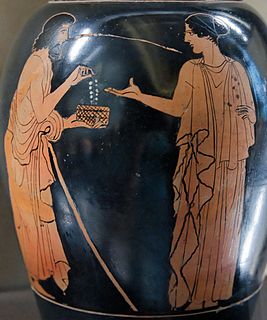
Eriphyle was a figure in Greek mythology who, in exchange for the Necklace of Harmonia given to her by Polynices, persuaded her husband Amphiaraus to join the expedition of the Seven against Thebes. She was then slain by her son Alcmaeon. In Jean Racine's 1674 retelling of Iphigenia at Aulis, she is an orphan whose real name turns out to be Iphigenia as well; despite her many misdeeds, she rescues Iphigenia the daughter of Agamemnon.

In Greek mythology, Atreus was a king of Mycenae in the Peloponnese, the son of Pelops and Hippodamia, and the father of Agamemnon and Menelaus. Collectively, his descendants are known as Atreidai or Atreidae.
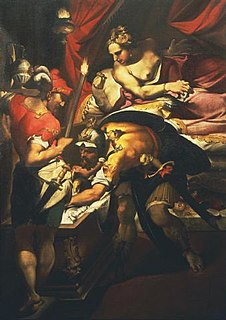
In Greek mythology, Thyestes was a king of Olympia. Thyestes and his brother, Atreus, were exiled by their father for having murdered their half-brother, Chrysippus, in their desire for the throne of Olympia. They took refuge in Mycenae, where they ascended the throne upon the absence of King Eurystheus, who was fighting the Heracleidae. Eurystheus had meant for their lordship to be temporary; it became permanent because of his death in conflict.

In Greek mythology, Harmonia is the immortal goddess of harmony and concord. Her Roman counterpart is Concordia. Her Greek opposite is Eris, whose Roman counterpart is Discordia.
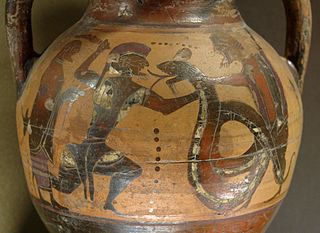
In Greek mythology, Pelops was king of Pisa in the Peloponnesus region. His father, Tantalus, was the founder of the House of Atreus through Pelops's son of that name.

Hippodamia was a Greek mythological figure. She was the queen of Pisa as the wife of Pelops.
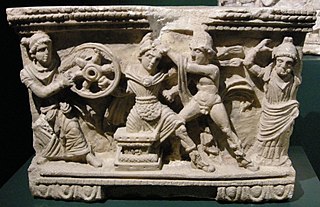
In Greek mythology, Myrtilus was a divine hero and son of Hermes. His mother is said variously to be an Amazon, either Theobule or Myrto; Phaethusa, daughter of Danaus; or a nymph or mortal woman named Clymene, Clytie, or Cleobule. Myrtilus was the charioteer of King Oenomaus of Pisa in Elis, on the northwest coast of the Peloponnesus.
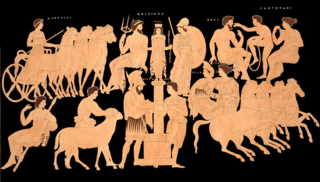
In Greek mythology, King Oenomaus of Pisa, was the father of Hippodamia and the son of Ares. His name Oinomaos signifies him as a wine man.

In Greek mythology, King Laius, or Laios of Thebes was a key personage in the Theban founding myth.

The Oresteia is a trilogy of Greek tragedies written by Aeschylus in the 5th century BC, concerning the murder of Agamemnon by Clytemnestra, the murder of Clytemnestra by Orestes, the trial of Orestes, the end of the curse on the House of Atreus and the pacification of the Erinyes. The trilogy—consisting of Agamemnon (Ἀγαμέμνων), The Libation Bearers (Χοηφóρoι), and The Eumenides (Εὐμενίδες)—also shows how the Greek gods interacted with the characters and influenced their decisions pertaining to events and disputes. The only extant example of an ancient Greek theatre trilogy, the Oresteia won first prize at the Dionysia festival in 458 BC. The principal themes of the trilogy include the contrast between revenge and justice, as well as the transition from personal vendetta to organized litigation. Oresteia originally included a satyr play, Proteus (Πρωτεύς), following the tragic trilogy, but all except a single line of Proteus has been lost.
The Greek Heroic Age, in mythology, is the period between the coming of the Greeks to Thessaly and the Greek return from Troy. It was demarcated as one of the five Ages of Man by Hesiod. The period spans roughly six generations; the heroes denoted by the term are superhuman, though not divine, and are celebrated in the literature of Homer.
In Greek mythology, Chrysippus was a divine hero of Elis in the Peloponnesus. Sometimes referred to as Chrysippus of Pisa (Greece).

Iphigenia in Tauris is a reworking by Johann Wolfgang von Goethe of the ancient Greek tragedy Ἰφιγένεια ἐν Ταύροις by Euripides. Euripides' title means "Iphigenia among the Taurians", whereas Goethe's title means "Iphigenia in Taurica", the country of the Tauri.

692 Hippodamia, provisional designation 1901 HD, is a stony asteroid from the outer region of the asteroid belt, about 45 kilometers in diameter. It was discovered on 5 November 1901, by the German astronomers Max Wolf and August Kopff at Heidelberg Observatory in southern Germany. Nine years later, the body was rediscovered by August Kopff at its apparition in 1910.
In Greek mythology Tantalus, not to be confused with his more famous grandfather and namesake (Tantalus) who was also called Atys, was the son of Broteas. He ruled over the city of Lydia. He was the first husband of Clytemnestra and was slain by Agamemnon, King of Mycenae, a soldier in the Trojan War, who made Clytemnestra his wife. After he died, the Tantalid dynasty finished because Agron took the throne. He was a great-grandson of Heracles and Omphale, Atys's stepmother.

The Necklace of Harmonia, also called the Necklace of Eriphyle, was a fabled object in Greek mythology that, according to legend, brought great misfortune to all of its wearers or owners, who were primarily queens and princesses of the ill-fated House of Thebes.

The Eastern pediment of the Temple of Zeus at Olympia depicts the tale of Pelops just before the chariot race wherein he kills the king Oenomaus in order to win the hand of his daughter Hippodamia. The depiction of this chariot race on the east pediment of the Temple of Zeus at Olympia, along with that of the Twelve Labours of Heracles on the metopes of the frieze, relate to the location of the temple in Olympia; the chariot race and Heracles were both believed to have started the tradition of the Olympic Games.
In Greek mythology, Tantalus may refer to the following related personages:
| | This philosophy of religion-related article is a stub. You can help Wikipedia by expanding it. |